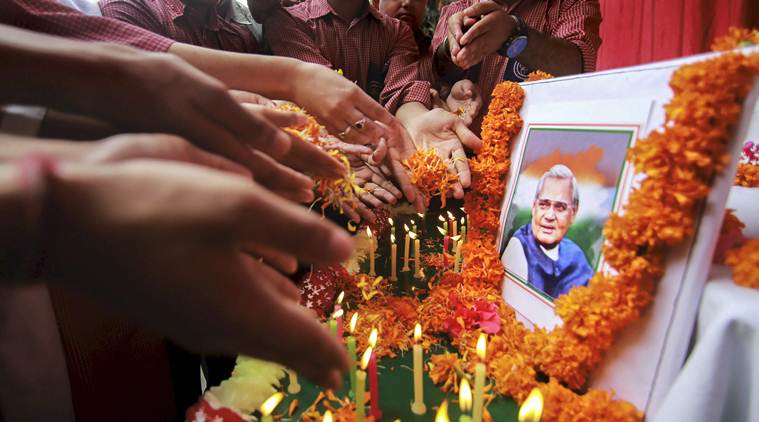Fifth column: A personal tribute to Atalji
"After the Babri Masjid was demolished I asked him why he did not leave the BJP if he was so unhappy with what had happened. He replied in the words of that famous song, ‘Jaayein, to jaayein kahaan (Where should I go)’."

“Rest in Peace Atalji. You achieved more in a single lifetime than most men can dream of.”
From the moment I first heard Atal Bihari Vajpayee speak I was bedazzled. I have described this moment in detail in my book Durbar, but this week as we say goodbye to Atalji I want to revive the memory of how important he was to turning the tide against Indira Gandhi. When she announced elections in January 1977 everyone was sure she would win. With every major opposition leader in jail for nearly two years and with every opposition party in a shambles, her victory seemed certain despite the Emergency. So on that rainy winter evening that the opposition leaders chose to hold their first election rally in Delhi, I went, as did most journalists, to show solidarity more than anything else.
The first shock was that Ramlila Maidan was full, and there were people sitting on walls and roofs and even on Turkman Gate. The second shock was that they did not leave even when the night got rainier and colder, because the opposition leaders made truly boring speeches. All they did was whine about their months in jail. In the press box, tedium set in early and some journalists left. I might have left too if a colleague had not told me to wait for Vajpayee since I had never heard him speak before.
It was past 9.30 pm when his turn came. And, no sooner did he reach the podium than the vast crowd stood up and started cheering. He did not disappoint them. He began his speech with a verse that in simple words told the whole story of the pain and terror of the Emergency. The verse he made up on the spot was this: ‘Baad muddat ke mile hain deevane. Kehne sunne ko bahut hain afsaane. Khuli hava mein zara saans to le lein, kab tak rahegi azaadi kaun jaane (It has been an aeon since we met. There are stories to tell and stories to hear. But, first let’s relish our freedom, for who knows how long it will last)’. The applause began after the first line and by the last line the huge crowd seemed to go completely mad. It was this extraordinary response to Atalji’s verse that made me consider the possibility of
Mrs Gandhi losing.
Mrs Gandhi losing.
In the years that went by, before he became prime minister, I met Atalji often. In Gwalior in 1984, I tried to warn him that he could lose to Madhavrao Scindia because there was a wave. After the Babri Masjid was demolished I asked him why he did not leave the BJP if he was so unhappy with what had happened. He replied in the words of that famous song, ‘Jaayein, to jaayein kahaan (Where should I go)’. In 1997, I spent a day with him in Lucknow to interview him for a television programme. He said he continued to admire Nehru but believed that copying the Soviet economic model had been a grave mistake. He said it was because of this that India had failed to provide her people with their most basic needs.
So when he became prime minister for a full term I hoped that he would make decisions that would change India’s economic direction definitively. This did not happen and nor did he do anything to dismantle the ‘durbari’ culture that circumscribes Delhi politics. The courtiers simply moved to his court and then back to the court of Sonia Gandhi when he lost the election in 2004. Corruption, cronyism and sycophancy remained rife and some of the bureaucrats on his team were more arrogant than any I have met before or since. It is my conviction that it was because of them that terrible mistakes were made in the handling of the Kandahar hijacking.
But, this is a week to remember him for the good that he did and not for the mistakes. He will be remembered for showing the courage to test a nuclear device despite international sanctions. When Pakistan responded by pulling its own bombs out of the basement it did not take long for the world to realise who was the responsible nuclear power and who the rogue.
His decision to get on to that gilded bus and drive in it to Lahore was one of the finest moments of his career, as was the speech he made in the Governor’s garden. ‘I came yesterday and I will leave tomorrow. This is the rite of all travellers. But, I want to remind you of the one change that will not happen and this is that we are neighbours and that we will always be neighbours because we are bound together by geography.’
Pakistan’s military men responded with the Kargil War, but not even this deterred him from inviting General Pervez Musharraf for peace talks in Agra. Rest in Peace Atalji. You achieved more in a single lifetime than most men can dream of.
Follow Tavleen Singh on Twitter @ tavleen_singh
For all the latest Opinion News, download Indian Express App
More From Tavleen Singh
- Fifth column: Truth about the Fourth EstateThe least abusive epithet used for me is that I am a ‘Lootyens’ journalist. ..
- Fifth column: Reviving bad memoriesIn recent weeks I have heard of tax raids in which there has been open extortion and in which upright citizens have been publicly humiliated.…
- Fifth Column: Taliban Khan or Imran Khan?Narendra Modi’s hand of friendship has been as firmly slapped away by the military men next door as Atal Bihari Vajpayee’s was when he famously…








































No hay comentarios:
Publicar un comentario